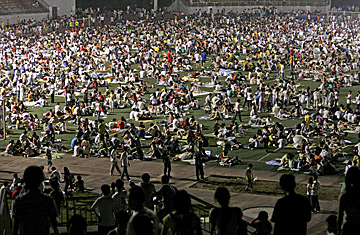
Students gather at a sports arena in Chongqing, China, May 13, 2008, following the earthquake.
They sleep on the field at the Nanhe Sports Center in tents lined up like city blocks. The bedding is arranged in its corridors so tightly packed that it is difficult to walk. On the walls are homemade signs — some with photos, some with elegant Chinese calligraphy — listing the names of the missing, many of them likely dead. In normal times the stadium hosts Cantopop concerts and tennis tournaments. Today it's hosting thousands of survivors from last week's devastating earthquake.
The offical death toll from the magnitude 7.9 temblor has passed 32,000, and it is expected to climb as high as 50,000. Two towns were evacuated Friday due to fears that rivers dammed by landslides were at risk of flooding their banks and inundating the quake hit areas, the state-run Xinhua News Service reported. Rescue efforts are now entering their final stages, when only the most extreme cases of survival emerge. On Saturday, 165 people were rescued from flattened buildings, a State Council spokesman said. President Hu Jintao told visiting survivors Friday that although the "golden 72 hours" when pulling survivors from the rubble is most likely has expired, saving lives is still the priority.
But soon China will be faced with an equally monumental task: how to house the 4.8 million people who have been left homeless by the quake. As a result, victims are living anywhere they can. Public spaces of towns in the disaster zone are filled with tents. The Sichuan Ministry of Civil Affairs says it has provided 30,000 tents, but most are living in homemade structures built out of the red, white and blue plastic used for shopping bags in China. In Chengdu, many people sleep under highway overpasses. On the way to Yanmen village, where 10,000 people were left homeless, people have pitched their tents in the road, more afraid of their damaged houses than being hit by cars in the night.
People left homeless by the quake are now housed in 2,885 locations. They are spread across the disaster area; few have any idea of when they will be able to return home. Many towns and cities in this part of central Sichuan province were ravaged by the tremor, and along with the buildings that were flattened, many more will have to be demolished.
Jia Shungang, 36, was relatively lucky. There were few deaths in his neighborhood of Mianyang city. He is now camped out with his family in a parking lot near a museum dedicated to the Tang dynasty poet Li Bai, who lived in the area. A family sits outside a tent nearby, the grandmother's eyes and legs badly bruised from when a house collapsed on her. Conditions in the camp are decent, Jia says, but he wonders how long he will stay. "We don't know how long we'll be here," he says, as a worker walks through with a chemical sprayer strapped to his back, pumping disinfectant into the air. "The government hasn't told us."
The nearby Nanhe Sports Center, where 8,000 quake victims live, resembles a small city in its size and organization. At the gate, people sleep on sacks of laundry detergent. Others pore over lists of injured. The biggest fear is infectious disease, and doctors and nurses wander through the crowds giving evaluations. Children sit in the field and watch a movie featuring Taiwan film star Jay Chou. Classical music plays over the loudspeakers. Lines of residents completing registration forms snake through the complex. Zhu Linzhen, 40, stands with her son, fighting to maintain her spot. "We have nothing," she says. The camp isn't bad, she says, but "I don't do anything all day." Above the entry gate is a red sign with white characters about 10 feet tall that reads, "The people of the disaster zone thank the Communist Party."
For camp resident Li Baorong, 37, memories of the recent past overwhelm any thoughts about the future. When the quake hit her hometown of Beichuan, she told her mother to run out of their house. She told her to be quick, but when she looked back her mother, who was just a few steps behind, was engulfed in their collapsing house. "I regret that I allowed her to trail behind," Li says. Now she is trying to find the other survivors from her family, which lost seven members. "Where we will go next, I don't know," she says. "This just feels like a temporary stop while we put ourselves back together." Given the scale of the destruction, the stadium housing may be less temporary than she thinks.
— With reporting by Lin Yang/Mianyang
